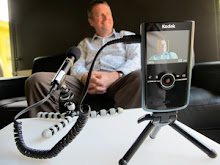Catching Up
Although I thought I had added a general post late last Sunday, my unforgivable lack of blogging experience meant it was lost (somewhere) - never to be seen again? What I did say was that I am really excited (and will soon, I am sure, be humbled!) to see what everyone makes of the existing footage. The themes & ideas are strong and I am confident you will all create something very powerful. I hope you all got my individual comments - at least where I could be sure what to click on! More on your latest posts shortly.
Harvesting Ideas for Your Documentary
A good idea, at this stage, is to start looking closely at as many short excerpts or examples of different approaches to documentary directing & editing as you can find. Keep a little journal - even on your mobile phone. What was really effective about that last film? How much did it take to make the point? When was the director in danger of losing you? etc...
Here are some easy starting points:
http://www.bbc.co.uk/filmnetwork/films/category/documentary/
http://www.bbc.co.uk/worldservice/arts/2010/01/100119_myworld.shtml
http://www.itvs.org/
http://english.aljazeera.net/programmes/witness/
http://english.aljazeera.net/programmes/ragehomaarreport/
http://www.hollanddoc.nl/kijk-luister/documentaire/d/de-kleine-oorlog-van-boer-kok.html
http://gradfilm.tisch.nyu.edu/page/gfilm_showcase.html
The point is not just to watch random clips but to immediately note down things that strike you - good & bad! Then try sharing your impressions with others, as a blog entry, or check out other people's suggestions and give your own assessment, in the comments. There was never a safer group in which to try this out and get it right!
Montage as a showcase for editing
Also, look for examples of how other people use 'found footage' (old newsreels etc.) to tell stories through a 'montage' approach - where editing is everything. Sharp ironies and controversial claims are possible, juxtaposing contrasting sounds, images or carefully nuanced intertitles. Adam Curtis demonstrates many of these possibilities in an ambitious film that was the basis for an award-winning multi-media installation in Manchester. Take a look at Part One to see how much ground he attempts to cover:
http://www.youtube.com/watch?v=SfIFeqScJz8
Now what?
Review what caught your attention and ask yourself:
What would the decision to add or remove these touches do for my storytelling and the finished film? If other elements are working together powerfully enough, there should be no need to spell out for the audience what is happening or how they might feel about it. When you can judge this for yourself (or others finally convince you to stop being stubborn!), it might be time to drop certain shots or soundtrack ideas. You might have been especially proud of some of these when they first occured to you but they may no longer be appropriate. Never be afraid to admit this - it's what William Faulkner, the Nobel prize-winning novelist, once said about writing when he coined the phrase 'Kill your darlings'. This was never truer than when applied to film!
Sunday, May 29, 2011
Monday, March 29, 2010
The Yes Men Fix The Hague
Join my son, Euan, and I as we venture out onto the streets of The Hague on Saturday 27th March 2010, as part of a live 'activism 2.0' demonstration by Mike Bonnano of The Yes Men: The Yes Men Fix The Hague Watch as the good citizens of The Hague are confronted by 'Shell Street Teams' bearing sincere apologies for the company's record on pollution and human rights in the Niger Delta
This followed a screening of their latest film ' The Yes Men Fix the World ' - one of the prize-winning films featured in the annual "Movies that Matter" festival, organised by Amnesty International & The Hague City Government
Subscribe to:
Posts (Atom)
